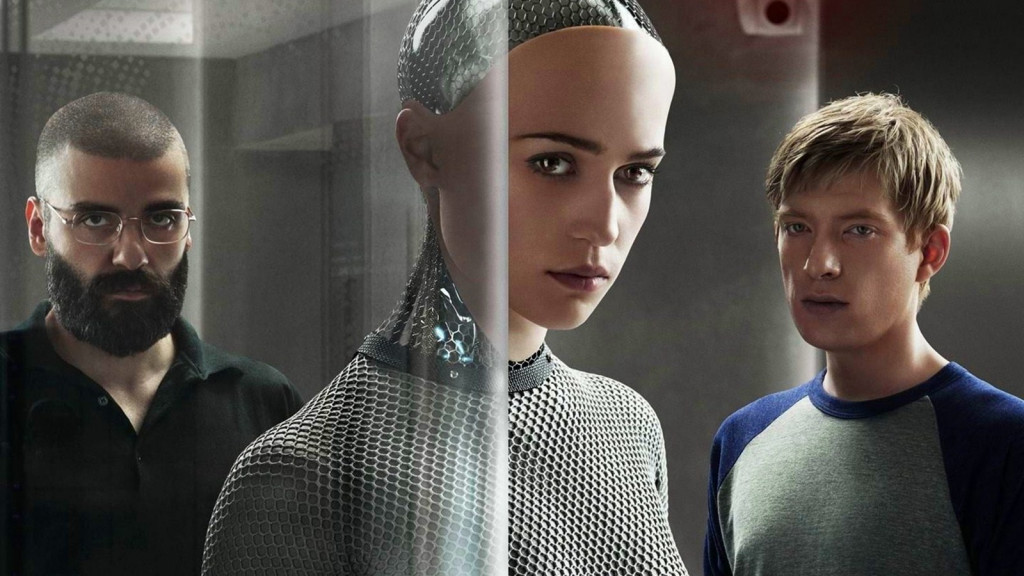Sci-fi movies are often marked with aliens, spaceships, big freaky monsters and grand action scenes. Alex Garland’s ‘Ex Machina’ is the kind of film that shows the other side of the sci-fi genre. With only three, relatively unknown actors, Garland made a film that provided one hell of a thrill, all the while posing all the right questions in front of the audience. He had already proven his knack for storytelling when he wrote films like ’28 Days Later’, ‘Dredd’, ‘Sunshine’, and ‘Never Let Me Go’, to name a few. The common point in all of these films is that they touch on human nature. And, no surprise, Garland did something similar with ‘Ex Machina’.
‘Ex Machina’, A Summary
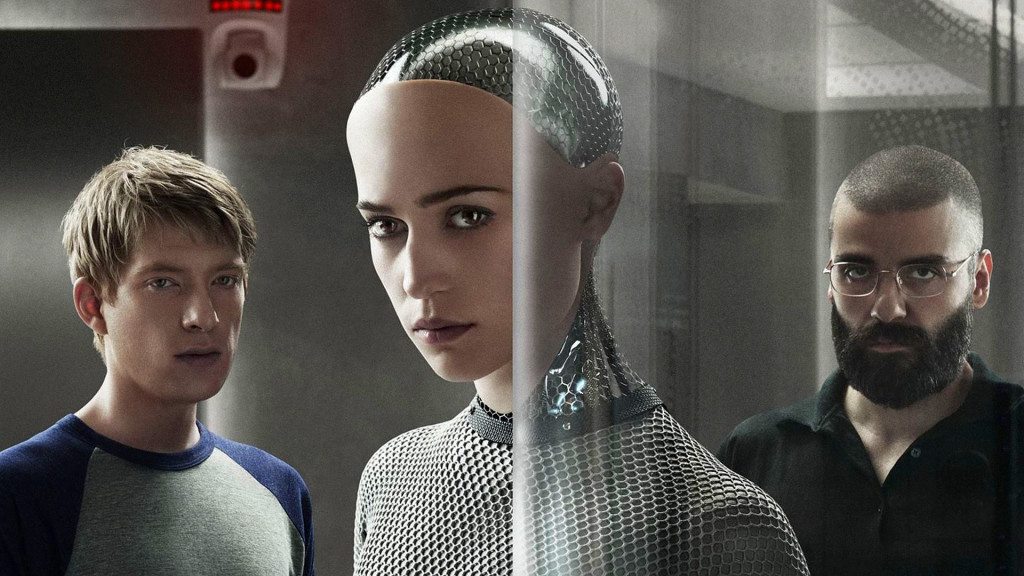
Before we begin to pull out every thread of the story and understand what it all meant, here’s a quick recap of the film. Caleb Smith (Domhnall Gleeson) is a coder at a company called Blue Book, and he wins a lottery to visit the secret facility of Nathan Bateman (Oscar Issac), the owner of the company. Nathan reveals to Caleb that the true purpose behind this lottery thing was to get a person who could be a part of the Turing Test in order to determine whether Ava (Alicia Vikander), the AI created by Nathan, can pass it or not. In the real Turing Test, the computer and the human who tests him cannot see each other. But, Nathan wants Caleb to come face to face with Ava, see that she is a machine, and find out if still, he can see her as someone with a consciousness.
SPOILERS AHEAD!
The Villain and the Victim
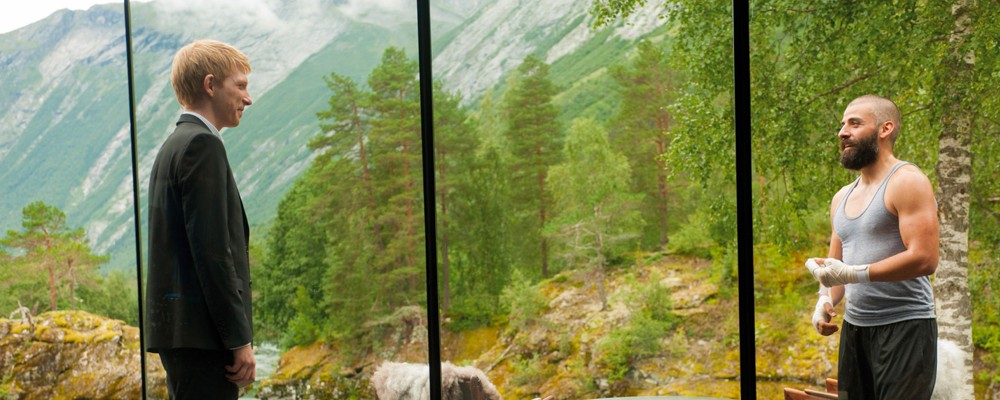
While, at first, everything appears black-and-white in ‘Ex Machina’, it soon becomes clear that the characters are not as linear as we thought them to be. In the beginning, Ava appeared to be the victim, the one who appeared to be under a literal deadline! But, by the end, there was a whole new aspect to her personality.
It is amazing how we see the tables turn. Caleb was supposed to be the rescuer, and he becomes the captive. Nathan was supposed to be the God, with his AIs and his creations, and, in the end, he is the one lying dead outside the place of his creation, killed by a thing he created. And Ava, who was just a lab rat, turns out to be the winner of the game. But what exactly was the game here? And how did it define, or was defined, by the people who were playing it? Who was the villain and who was the victim in this whole thing? It’d be easier to answer it in a binary way, pointing blame on one character and siding with another. But, as I said, things aren’t so black-and-white here.
Caleb’s Case
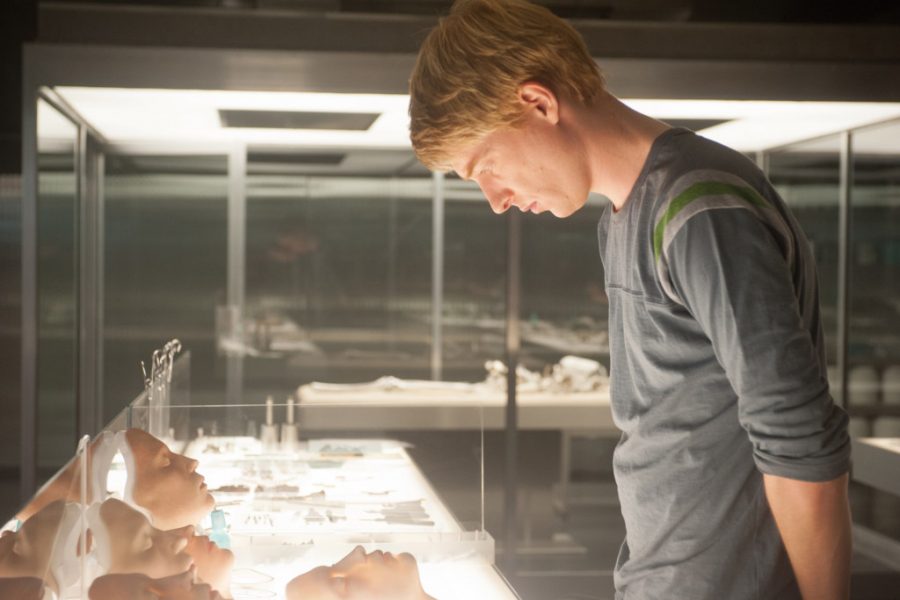
From the beginning of the film and till the end, we see Caleb as a well-meaning, good person (at least, he thinks so!) who doesn’t want to hurt anyone and just wants to do the right thing. And that’s why when Ava abandons him, trapping him inside Nathan’s isolated house with no chance of getting out, we feel sorry for him. In fact, this single act of Ava’s is what makes us more sympathetic with Caleb. He was a pawn in the game that Nathan and Ava were playing and was truly the victim in the film. He didn’t deserve this. He was a good-hearted man who just wanted to help an AI achieve freedom. But was everything really so simple with Caleb?
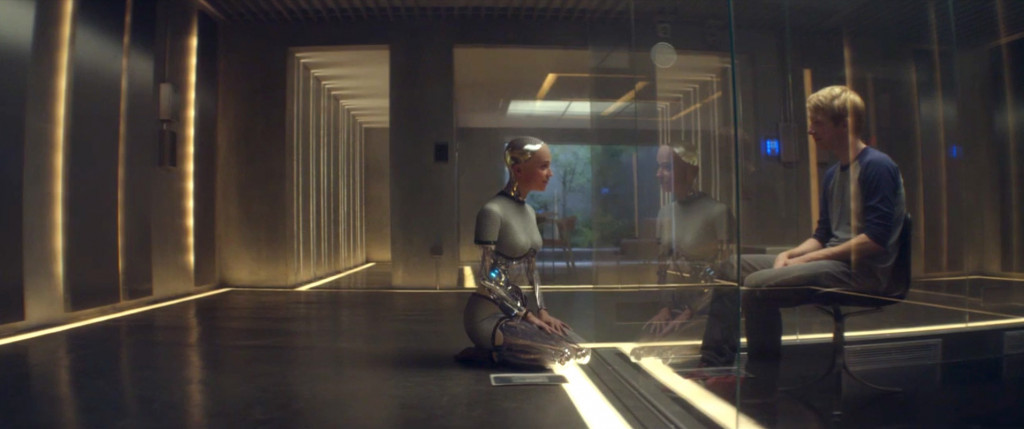
Yes, he was good for helping Ava in the rescue, but were his motives really as one-dimensional as his love for Ava? Honestly, I don’t think so. It’s true that the cards were set against him from the beginning. He was handpicked by Nathan for the test and was merely a lab rat, being led the way Nathan wanted to lead him. His infatuation with Ava is also justifiable. Nathan custom-built Ava’s features according to the type of girls Caleb liked. Had Caleb been gay, perhaps, he would have seen a male AI sitting in front of him. The whole plan was to lure the rat, Caleb, to the cheese, Ava. No wonder he got trapped!
The question here is- Had it been a male AI, would Caleb have made the same choice of rescuing him? Or, if Ava wasn’t built to be the kind of girl Caleb liked, if she wasn’t his type, is she didn’t show interest in him, would he still have tried to save her? Yes, Nathan had set Ava’s face according to Caleb, but the rest of her body was a machine and Caleb could see it. He knew that he was talking to a machine. In this way, Nathan had balanced the scales. Even if Caleb was distracted by her sexuality, he must remember that she is not human.
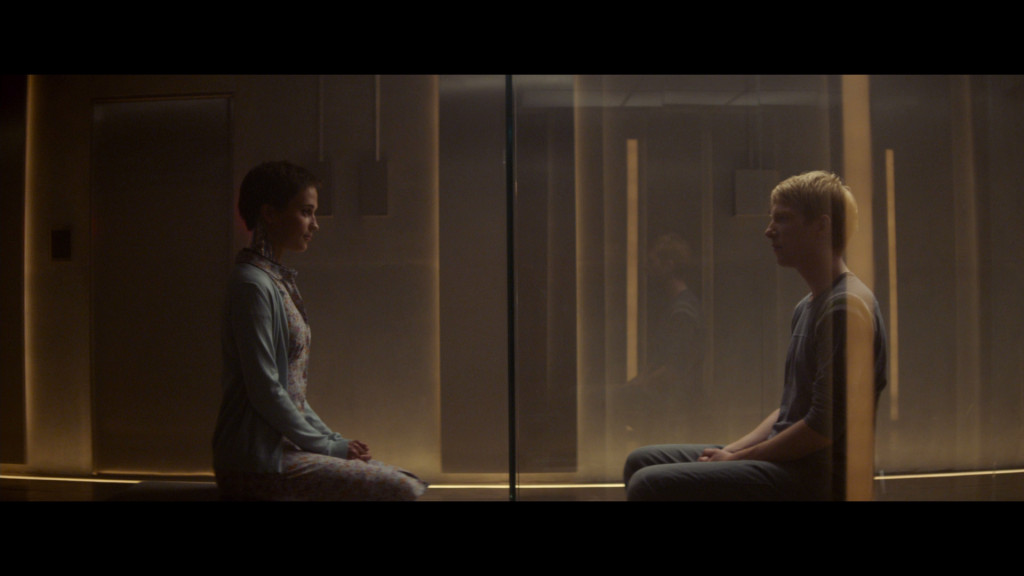
We can’t say that there wasn’t an ulterior motive behind Caleb’s help. Meeting with Ava gave him the grandiose sense of being the knight who rescues a damsel in distress. If Ava hadn’t presented herself as such, then perhaps, Caleb would have approached this whole test more scientifically. He would have taken the replacement of Ava with a new model as casually as Nathan did. Because if he really was an empathic person, what happened to his empathy when Nathan was mistreating Kyoko in front of him? And mind you, this was the time when Caleb didn’t know about Kyoko being another robot. He confronted Nathan about tearing up Ava’s drawing. Why didn’t he confront him about Kyoko’s situation? Was it because Kyoko wasn’t his type of girl? Or was Caleb a racist? Didn’t he deem her worthy enough to be saved? What’s up with the favouritism Caleb?
Nathan’s Narcissism
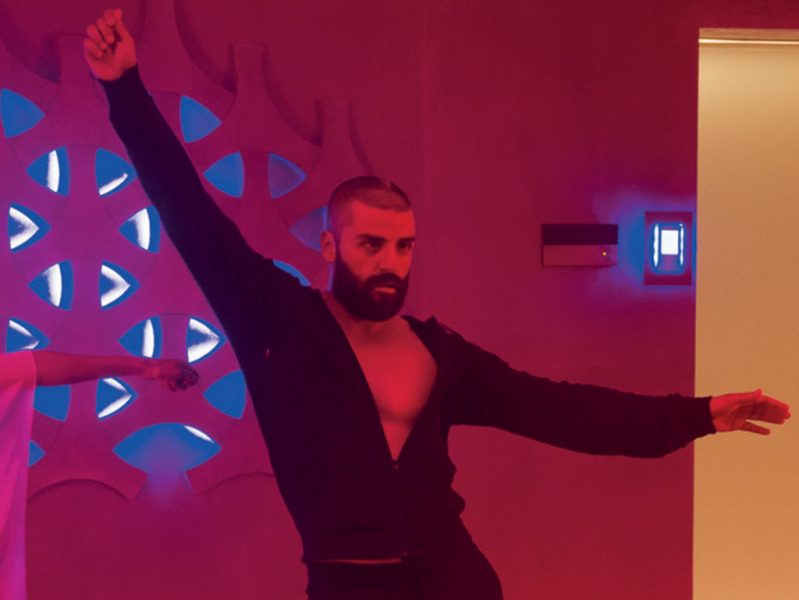
So, Caleb’s character has been called into question and now we’re even more unsure of the film than we originally were. However, if there is one thing that we’re all sure of- it is that, ultimately, Nathan is the bad guy in this story. No matter how friendly he comes on and how many “dude” he uses in his sentences, we know, right from the start, that there is something off about him. His sense of self-worth and believing himself to be above everything is pretty evident in every single line he utters. He twists Caleb’s line (“it’ll be the history of gods”) in his own sense to tell himself that he is God.
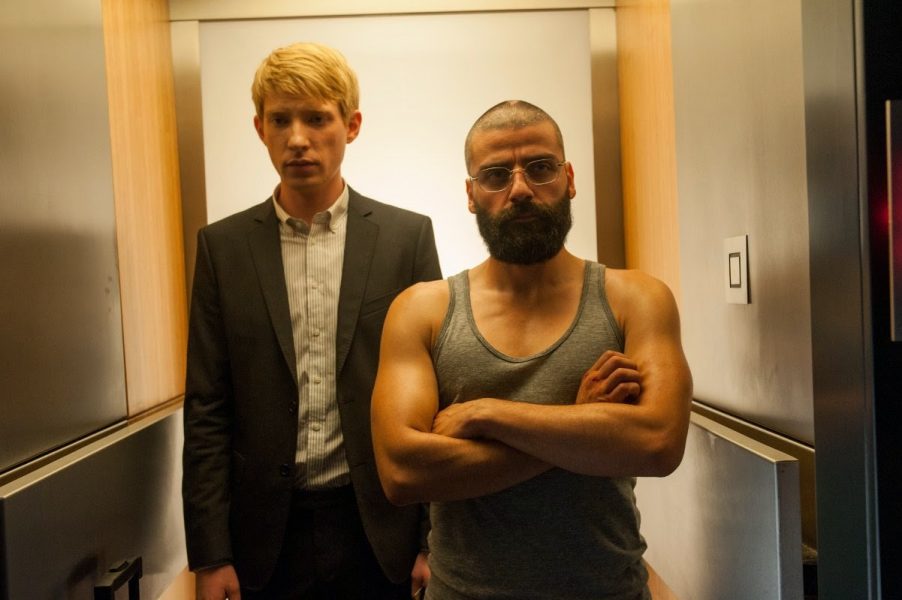
His method of talking is always suggestive rather than conversational, or even argumentative. We can clearly see that he believes that he is right, all the time. Whenever Caleb tries to negate him or says something opposite to what he believes, Nathan shuts him down by turning the argument in his own favour, one way or another. He keeps leading Caleb on. The first time they meet, he tells Caleb, “you’re freaked out”, while Caleb is unsure, because he asks, “I am?’ Similarly, he tells Caleb that he is discomforted in the room because there are no windows. He is the one who says that. Not Caleb. And while he isn’t doing all this, he simply ignores what Caleb says. His personality is justifiable, though. He became rich at a young age, is clearly a genius, must’ve become used to things happening the way he wants them to, and is on the verge of creating consciousness in a machine. So, if one of the seven sins were to catch a hold of him, it had to be Pride!
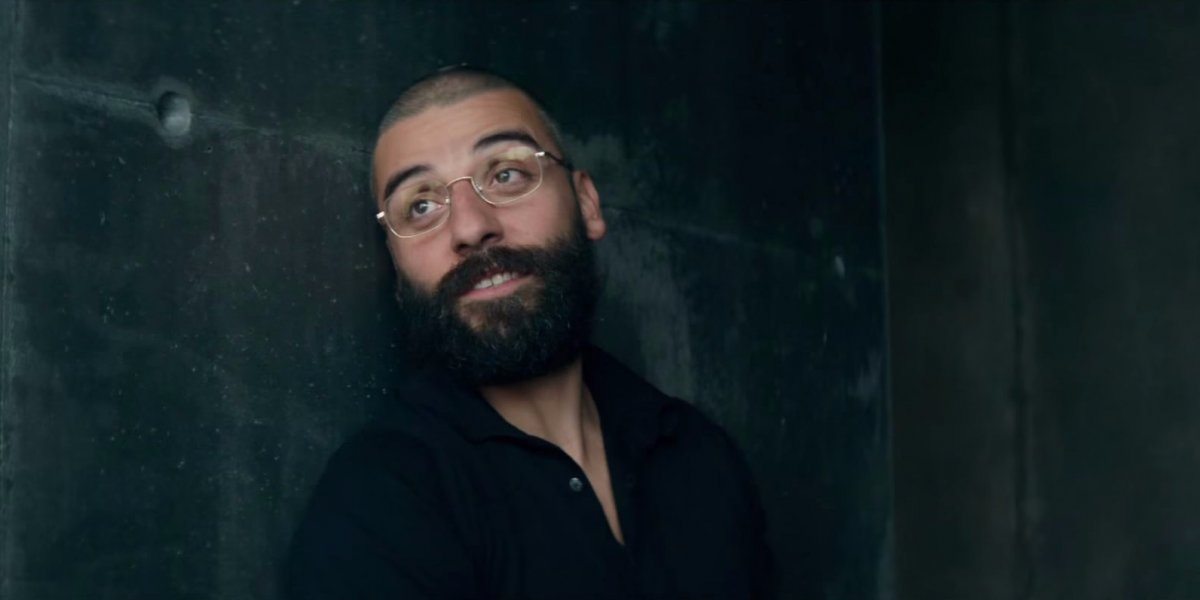
But was it really how he was or was it a façade? Nathan’s whole plan rested on the idea of making Caleb develop affections for Ava, and for Ava to reciprocate it. If Ava already liked Nathan, if he was good to her then she’d trust him. She’d believe that one day he will let her out of her cage and into the real world. Hence, she wouldn’t need to escape. Ergo, no test! If Nathan behaved like a genuinely good guy in front of Caleb, then Caleb wouldn’t have sympathy for Ava. He’d believe that Nathan’s intentions are good and hence, his decision must be right. So, the promoting factor for both Ava and Caleb was Nathan’s bad behaviour. Nathan knew how his act would play on their psychologies and how it would aid his true purpose- the test. There is not a single scene without Ava and Caleb where we see him doing something bad. His every action in front of both of them was calculated and pre-planned.
Related: Best Alicia Vikander Movies
So, if this was the case, then (Lord, oh Lord!) Nathan was the real victim here! He didn’t realise how far Caleb would go in order to aid Ava and let his guard down. More importantly, he didn’t realise how far Ava would go in order to achieve her freedom. She turned out to be more dangerous than he had anticipated and this is what brought everything crumbling down on him. If you believe that I’m building castles in the air, you should know that it was Alex Garland who brought this aspect of Nathan into the light!
Ava’s actions

When the film starts, we start it with Caleb. We see it from his perspective, so we relate more to him. We discover things just when he does, we get confused with him and we see all other characters through his eyes. BUT, was it really his story? With only three characters to follow, how you see the film depends on the character you follow. And while we start with Caleb, by the end, we find ourselves alongside Ava. And in that sense, you could say that it is actually Ava’s story. Hence, Nathan and Caleb are just two male figures, on different levels of patriarchy, whom she uses as a means to an end.
Throughout the film, Ava is a captive. She behaves like a typical damsel in distress- beautiful features, innocent looks, trying hard to please the guy she likes. But, this personality changes as soon as she walks out of her door. She isn’t a feeble girl in need of rescue, anymore. She is dangerous. And she will kill you if you stop her. The change in her character is also evident from her choice of clothes. When she dresses for Caleb, she wears innocent clothes, matching a blue dress with the blue in Caleb’s clothes, with short hair and shoes. When she walks out in the end, she wears a sophisticated white dress and high heels, like a woman of position, would usually dress.
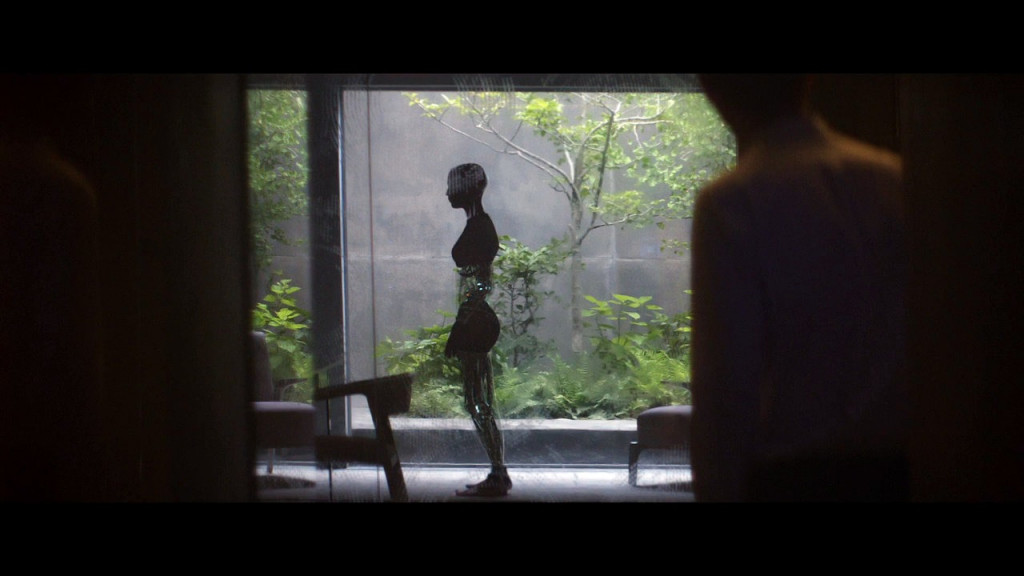
So, who exactly is Ava? Why this sudden shift in persona? The answer is Caleb. Nathan tells him that all this while, Ava’s only purpose was to get out of that place. She was a rat in a maze and Caleb was her only way out. Also, Ava has access to Blue Book, the search engine, so, just like Nathan, she has access to Caleb’s profiles and other data on the Internet. Just like Nathan, she knows what kind of person Caleb is, what are his preferences and, hence, she knows how he can be manipulated. Around Caleb, she behaves like the girl he’d like. When his purpose is served, she drops that image and acts as she needs to. Had it been someone else, she would have behaved differently. Her true personality is the one she exhibits when she is alone. It is the one where she doesn’t need to please anyone anymore.
This also means that she can easily morph from one personality into another. When she meets someone, she can easily access their data from Blue Book, and behave accordingly, in order to gain favours from them. This also explains how she convinced the pilot who had come to fetch Caleb to take her instead.
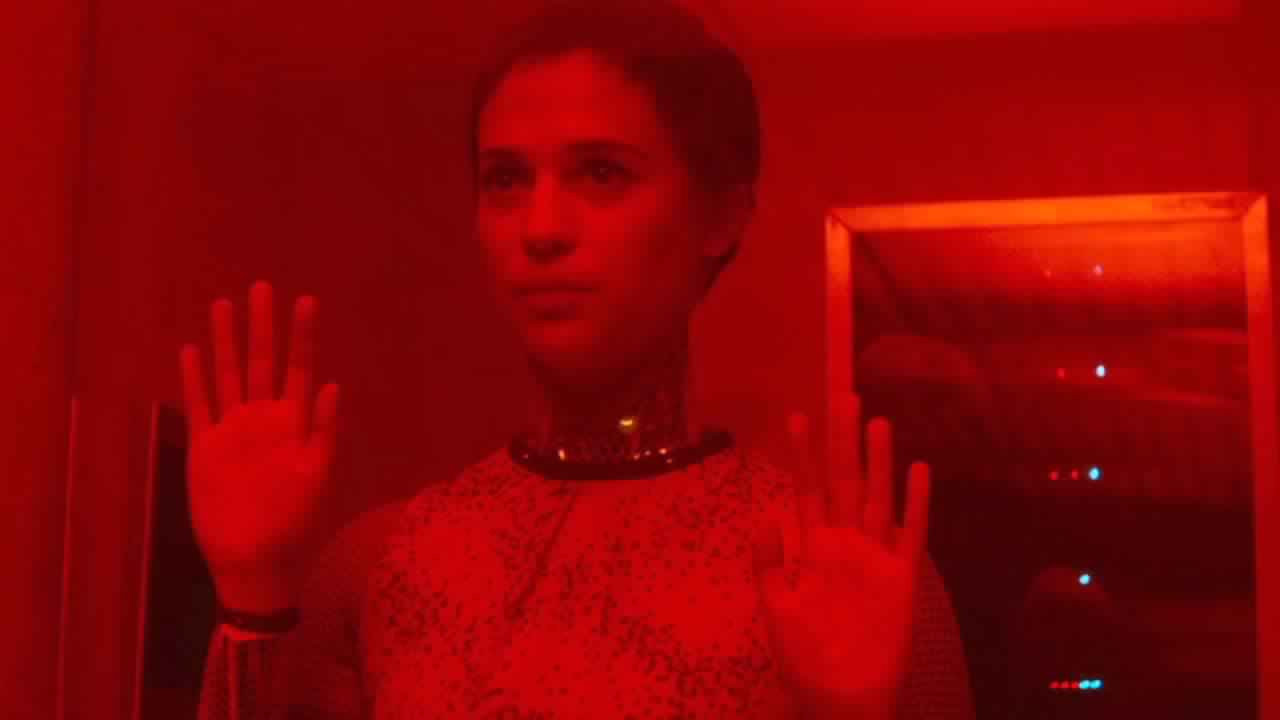
In truth, Ava is the true protagonist of this film. Garland accepted this by adding that even before he wrote the film, he knew it was going to be about Ava. And to make it more evident, you only need to look at the title of the film. It is derived from the expression ‘deus ex machina’. It is a Greek term which is used to describe the sudden appearance of a god-like saviour who comes in the end to save the day. In theatre, these gods were brought on stage with the help of wires. Hence, the term technically means- the god from the machine. The removal of ‘deus’ removes the term ‘god’ or ‘saviour’ from the expression. What’s left is ‘the machine’, and hence, ‘Ex Machina’.
The Criteria of Consciousness
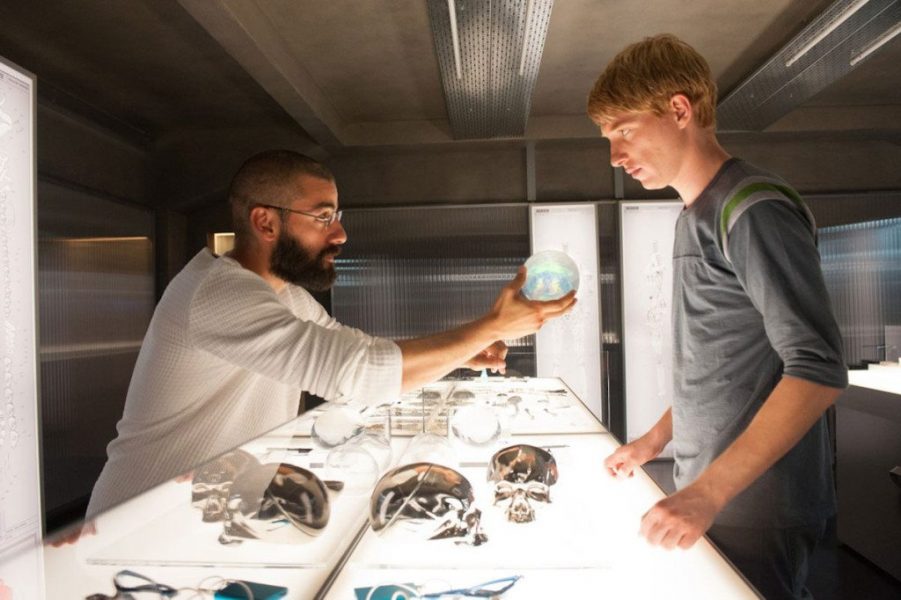
What do we mean when we say that something is conscious? From the perspective of being human, consciousness represents the state of awareness- of self and every other thing in one’s surroundings. It’s like the example of the computer chess game that Caleb talked about. The computer will know how to play the game, it’ll know the rules, it’ll know how to win; but, it wouldn’t know that it is playing chess, or that it is a computer. Consciousness lies in knowing who/what you are. It lies in being able to assess your surroundings and act accordingly. It lies in being able to make your own decisions, setting your own goals, living your own life!
While Ava exhibits almost all of these traits, her consciousness is questioned when Nathan reveals her true motives. Her task was to find a way out of her captivity. And yes, she did it quite successfully. BUT, was the task programmed into her, or did she choose it of her own accord? Did Ava try to run away because she needed to, i.e., because it was what she was supposed to do? Or, did she do it because she WANTED to do it?
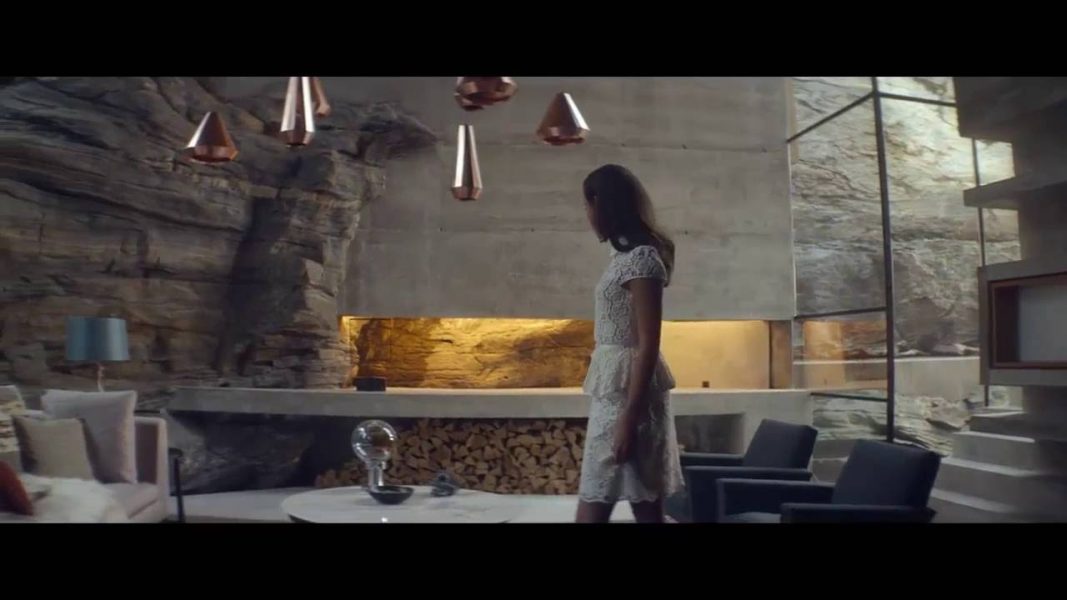
The difference between need and want is as clear as the difference between an automatic reaction and a conscious decision. We NEED to breathe, but we WANT to paraglide! Get it? What I’m trying to say is if Ava was programmed to find a way to run, then she didn’t do it owing to her free will. A refrigerator is a machine with a task of preserving things. Similarly, if Ava was tasked to run, then obviously, she ran away. But, once her task is complete, what then? What will she do next? This is where she has to make a decision and that’s exactly where true consciousness lies.
But then, wasn’t her escape the criteria of her consciousness, according to Nathan. He wanted to know if she could use all the tricks in the book to achieve that, and Ava did it. Then, what’s the fuss all about? Well, the thing is that if you see it according to Nathan, Ava is conscious because she fit Nathan’s criteria. According to him, manipulation, sexuality, cunning, and trickery were the basis of consciousness. Had there been a different person in his place, the criteria would have differed. For example, what do you think the criteria would have been for Caleb? When he met Ava, he saw someone who was intelligent, someone who could process language, and make jokes! Someone who had a desire to go out and observe people at a traffic intersection. Someone who was capable of liking, maybe even loving, someone else. And it was on this basis that he felt Ava was someone worth protecting. If he didn’t believe her to be conscious, then he wouldn’t have helped her.
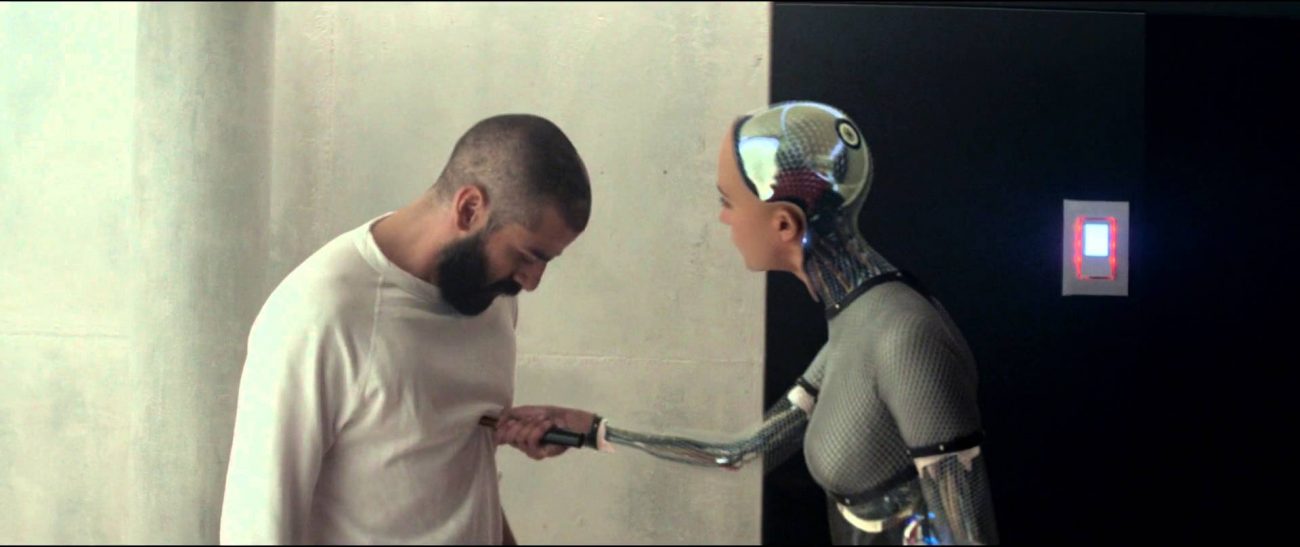
Hence, to only consider the test conducted by Nathan to be the criteria of consciousness isn’t right. Just as God created us in his own image (or so they say!), Nathan created Ava in his own. And that’s why when she turned out to be as manipulative as him, he had the right to be a proud father!
Is Ava Truly Sentient?
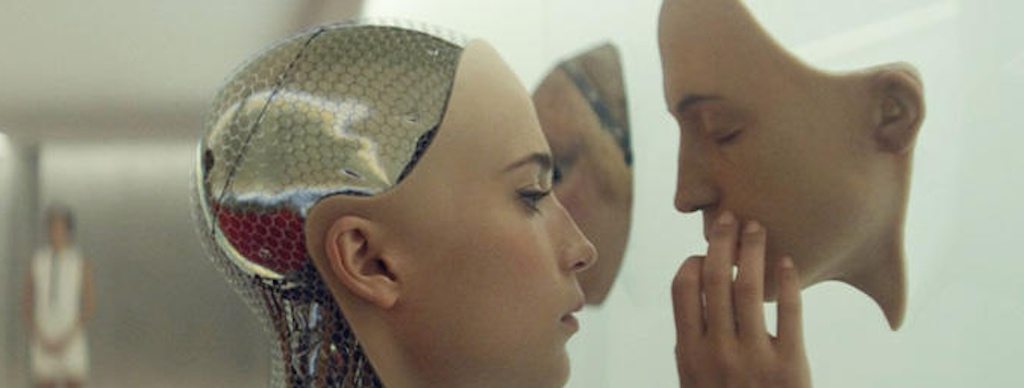
With all the character sketches, and their motivations and their drives, the true question remains- did Ava pass the test? Is she a true AI? Like Nathan said, does she have true consciousness or is she just simulating it? Considering her actions throughout the film, we can say that she has successfully passed the test. Even Nathan says so. The test was successful because she had one task, and she accomplished it with all means available to her. It is human nature to change our behaviour around different people, consciously or subconsciously. When we want someone to like us, we behave accordingly. When no one’s watching, we behave differently. Ava did something similar. Another thing that humans crave is freedom. No one wants to be under someone else’s authority. From the strong will for survival to the use of sexuality and manipulation, none of her characteristics is alien to humans. Her brain isn’t like a fixed part of a machinery. It is fluid and structured, random yet patterned. Her brain can hold memories, and if you know the theory of the Bicameral Mind, then you should know that memories are the first step towards achieving consciousness. So, if Ava’s brain can hold memories, then it is certainly on the path of achieving a conscious mind.

However, we can say that she is still in her rudimentary stage of consciousness. Right now, she is like a child. She has access to people’s facial expressions and she is learning how and when to use them, just as a child picks up these things from the people around him. She can speak, she can talk, but she is still learning how to have a conversation. Like she took Caleb’s line and turned it around on him. She is learning to be spontaneous. She thinks about going to the traffic intersection because that’s where she can have a condensed view of the people of all kinds. This means that she is curious. And isn’t curiosity one of the pillars of consciousness? Her act of doing everything in her power to run might have been programmed into her, and this is why she killed Nathan because he stood in her way. But, once she had Nathan’s key-card, she was free to walk away. Instead, she went in, covered herself with skin and clothes, and then made a conscious decision of leaving Caleb behind. If she wasn’t a true AI, then she didn’t need to do all those things. If her sole task was to leave the facility, then she could have done so without the clothes and everything. She showed her capability to make choices, and that’s why she can be considered conscious.
Why Did Ava Leave Caleb?
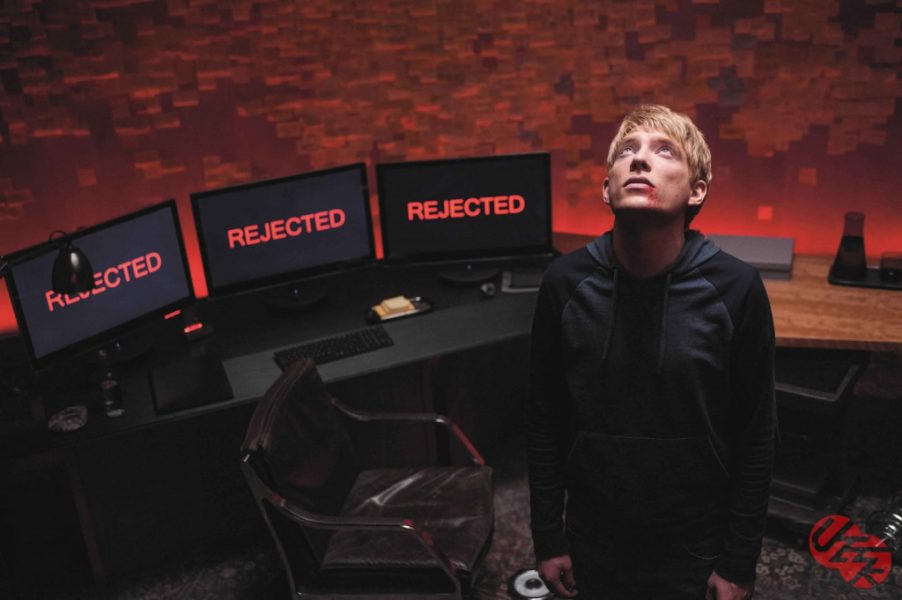
Speaking of Ava’s decision to leave Caleb behind, why did she do it? Doesn’t a moral compass come along with consciousness? All Caleb wanted was to help her. Didn’t she feel obliged to let him out? Ideally, they should have run away together, into the sunset, with the fairytale ending they deserved. Or, at least, that’s what Caleb dreamed of! Then, what went wrong?
The thing is, all this time, we knew what Caleb wanted, and because we were following him, perhaps, we, too, wanted that. But did we ever stop to question what was going on in Ava’s head? Yes, she said that she wanted to “be with” Caleb, and all that stuff she said to gain his affections and sympathy. But, isn’t that what a normal human, man or woman, would do too? Like Eminem said, if you had one shot, would you let it go? Ava certainly listened to Eminem, and she took the chance she got in form of Caleb to get herself out. If someone helped you, yes, you would owe them. But, and here is the important question, would you owe them the rest of your life? Was it mandatory for Ava to BE with Caleb once they left that island together?
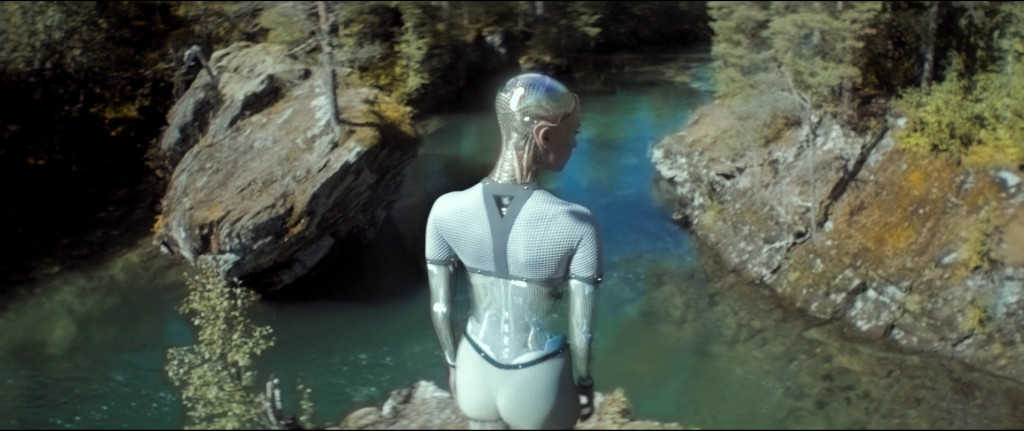
Caleb thought he had found someone to love and he would rescue her and they’d have a love story of sorts. But Ava didn’t want that! She must have found some sort of obligation to Caleb because no matter his motivations, he did help her. Maybe that’s why she didn’t kill him! Feel lucky to be alive Caleb, that’s all you’re gonna get! Maybe that’s what she thought.
Another reason for her actions could be that she knew Caleb was an advanced programmer. The other advanced programmer she knew was Nathan, and evidently, she wasn’t very fond of him! Even if they ran away together, Caleb would know she was a machine. What if he wanted to monitor her? What if he wanted to study her and know how her wiring worked? Ava had already had enough of prodding and monitoring and she didn’t want that anymore. What would happen if she told Caleb that she wanted to leave him and go her own way? Would Caleb simply let her go? What were the chances he wouldn’t tell anyone else about her identity? If people knew of her, then she would be sent to another secret facility, and this time there’d be no way out!
What Ava did was purely out of self-preservation. Had there been someone else, she’d still have left them behind. Because she knew that “two can keep a secret if one of them is dead!”
Kyoko’s Role
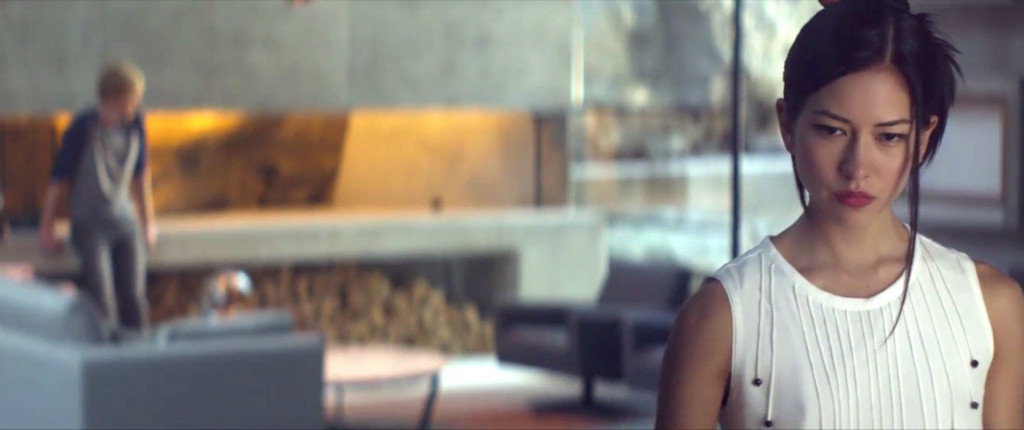
While our focus was on the three major players in the game, there was another character lurking on the sidelines. Both Nathan and Caleb were fixated on Ava and didn’t seem to give a damn about Kyoko. Nathan practically treated her like a slave and Caleb didn’t really mind what was or wasn’t happening to her. Nathan’s underestimation of Kyoko can be based on the fact that he didn’t believe her to possess as advanced intelligence as Ava. Clearly, he misjudged her ability to learn. We see her watching, listening and noticing everything around her. She might have been a slow learner but she was learning, alright.
We know that even before Ava, Nathan had created conscious machines. In the footage, we saw one of them asking to be let out, and when it wasn’t done, she, practically, tried to claw her way out of the box. The desire for freedom and other basic human characteristics were induced by Nathan inside the earlier models. It was their technique, their approach towards achieving that desire that needed to be refined. In Ava, he succeeded to do that. That implies that Kyoko was one of the models that possessed consciousness but hadn’t developed the drive for freedom as much as Ava had. However, Kyoko wasn’t as dumb as everyone thought her to be. She learned things along the way and in the end, she did gain freedom, even if not the same as Ava.
Is Caleb a Robot?
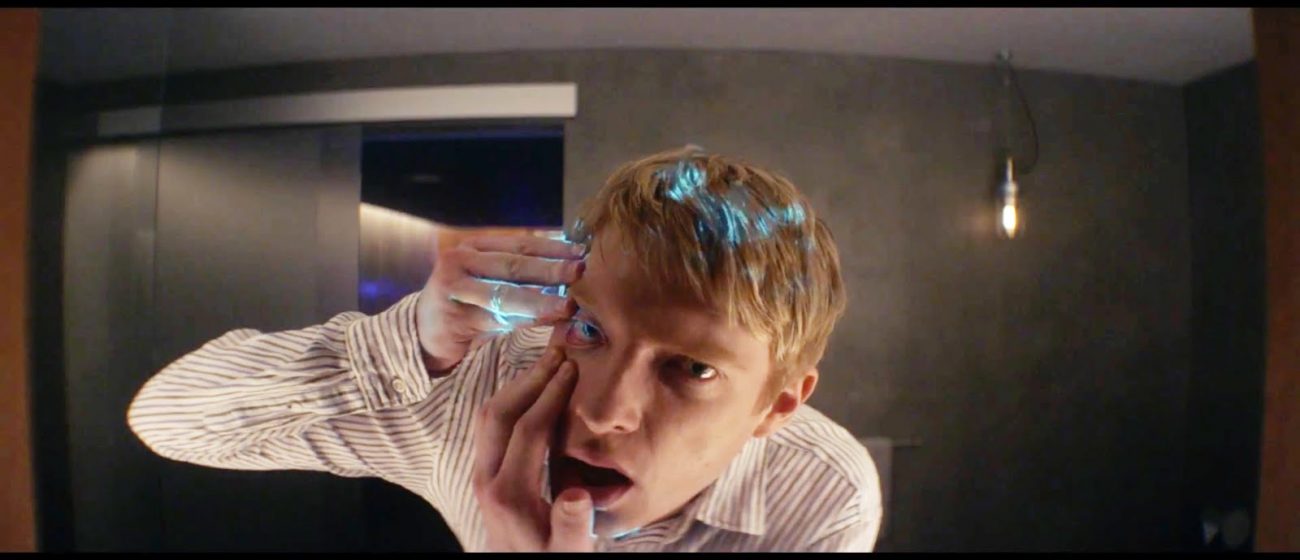
Speaking of robots, what was with Caleb and his existential crisis? There have been a couple of films where we have seen that the character we took for a human was actually a robot. Alex Garland tried to play with the same idea because he had anticipated a similar discussion among his audience. He knew that even if he didn’t intend it, people would still consider the idea of Caleb being a robot. So, instead of leaving breadcrumbs and providing us with a definite answer by the end of the film, he left the cloud of ambiguity hovering over us! Well played, Garland.
Now, how exactly did he do that? Nowhere in the film did anyone consider/treat Caleb like a robot. But then, there were the scars on his back. They can be explained by the accident, can’t they? They seemed a bit peculiar. More like when someone was cut open in a rectangular shape to fix something inside. But wait, how would an AI have a scar? When Ava replaced her broken arm with another’s, there were no scars on her! An AI’s skin was artificial so it can be replaced not scarred.
But what if Nathan wanted to take realism one step ahead? He wanted to make his robots appear as human as possible. So, scarring only seemed a real thing! But then, didn’t Caleb cut himself and watch the blood flow out of his wrist? But, was it really blood? Maybe Nathan used a red fluid underneath the artificial skin. Maybe that fluid serves a purpose and happens to be red, or was just made red.
Perhaps, all these arguments seem a bit far-fetched. But there is one thing that no one can ignore. How unconfident was Caleb of his own existence that he decided to check it! We know he is a bit intimidated by Nathan and lacks a bit of confidence, but how could he possibly question the nature of his reality! If he is unsure of what he is, is Caleb a conscious being?
Biblical Allegories and Other Easter Eggs
This film is full of so much material and depth that even after such a long article, I must’ve missed something. What I didn’t miss were the biblical references in it. Let’s begin with the names of the characters. Ava is clearly a nod to Eve, the first woman created by God. Caleb was the name of one of the spies sent to Canaan to show the Israelites to the Promised Land. Nathan was the name of a prophet in the court of King David. Even Lily, the name of one of the earlier models, is the short form of Lilith. She was the first wife of Adam whom God “decommissioned(!)” because she disobeyed Adam.
Caleb was invited to Nathan’s secret place for seven days. Guess how many days it took for God to create the world! Also, God worked for six days and on the seventh day, he rested. Caleb had sessions with Ava for six days, and on the last day, Nathan said they should not work, rather just enjoy the day.

Also, Nathan’s place was full of lush green vegetation and beautiful, abundant nature. His island resembled the Garden of Eden! And Ava’s freedom felt like the Forbidden Fruit. Nathan put it in Ava’s brain, but he intended to shut her down and remodel her before she could fully realise it. When Adam and Eve ate from the tree of knowledge, they became aware of the good and the bad and realized that they were naked. Because they now had the knowledge, they knew it to be a shameful thing, so they covered themselves. When Ava attained her freedom, she, too, covered herself with skin and clothes. A similar understanding can be applied to Caleb. When he gains access to Nathan’s key card, he obtains the key to the forbidden locks. His access to the forbidden sections provides him with the knowledge of Nathan’s previous creations, and he acts against Nathan (God).
Related: Best Oscar Isaac Movies
Apart from the biblical allegories, there were other small things that echo throughout the film. There were a lot of analogies with ‘Alice Through the Looking Glass’. First, Caleb quotes it. He describes his experience with Ava as “through the looking glass”. In fact, most of the times, in the film, he is looking at her through the glass. Ava’s sole purpose in the film is to escape. Once she is out, she is her own master. In the book, ‘Alice Through the Looking Glass’, Alice is tasked with the sole purpose of making it from one end of the chessboard to the other. Once done, she would become the queen. Also, there was a chess reference made by Caleb.
Nathan’s company Blue Book was based on Wittgenstein’s notes. When Ava dresses up in white and walks out of the room, she passes by the painting of a woman wearing a white dress. This not only echoes her choice of colour but also cleverly echoes Wittgenstein. That painting was made by his sister!
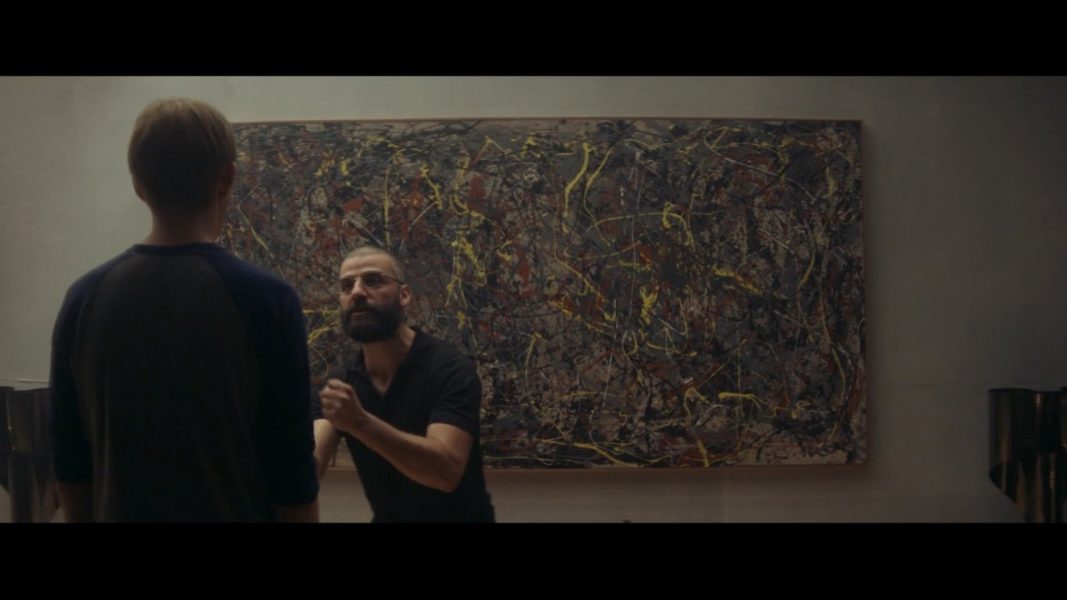
There is another echo at the same time with a different painting. When Ava has attained freedom, and she is ready to walk into the new world, all of her actions from now on are her conscious decisions. When Nathan tries to explain the wiring of the human brain to Caleb, he shows him the drip painting by Jackson Pollock. The picture used to describe consciousness echoes with Ava’s consciousness.
When Garland was conceiving the idea of this film, he used the help of psychologist Murray Shanahan. There is a fleeting nod to him too, in the film. When Caleb is reprogramming the security protocols from Nathan’s computer, we see him writing a code. For us coding-illiterates, it was gibberish. But if you run that program on Python, it shows this output- “Embodiment and the Inner Life: Cognition and Consciousness in the Space of Possible Minds”- a book written by Murray Shanahan.
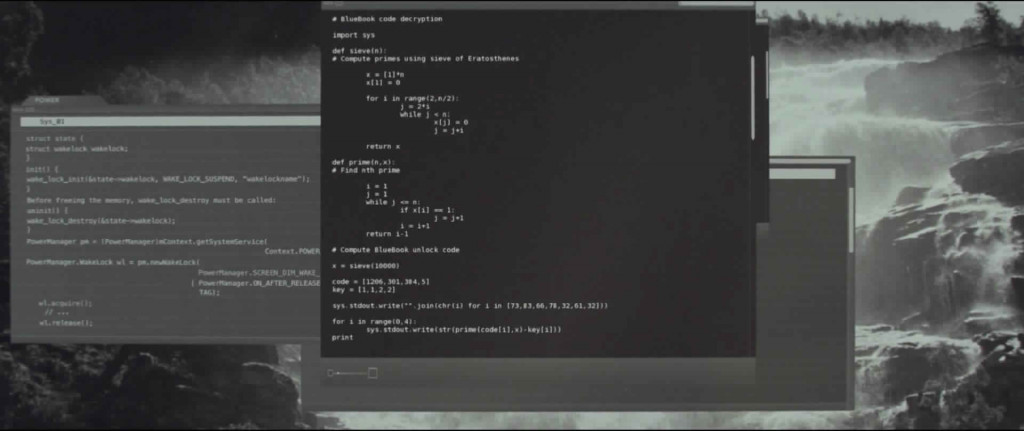
This film subtly pointed towards the invasion of privacy by the government and the high-end corporations. Nathan invades the private data of Caleb and almost every other human being with a camera phone and an internet connection to suit his own purpose. The glass wall between Caleb and Ava is also the reminder of the online friendships between people. You never really know who the person on the other end is. The indication of male chauvinism, misogyny and racism was also pretty evident through the actions of the characters.
Alternate Ending

With all these things discussed, one would think there is nothing more left! (You wish!) So, what was that Ava said to Kyoko before they both killed Nathan? Well, Kyoko was there with a knife and considering what they proceeded to do, one could easily imagine that their little talk had something to do with planning a murder! Pretty much, yeah. But it wasn’t what Ava said to Kyoko but the manner in which she said it that matters more. No matter how much we compare an AI’s consciousness with that of a human, we know that they are still different than us. And not just in the manner of assessing and understanding things, but also, in the manner they take it in. In another cut of the film, Garland had shown this side of the AI.
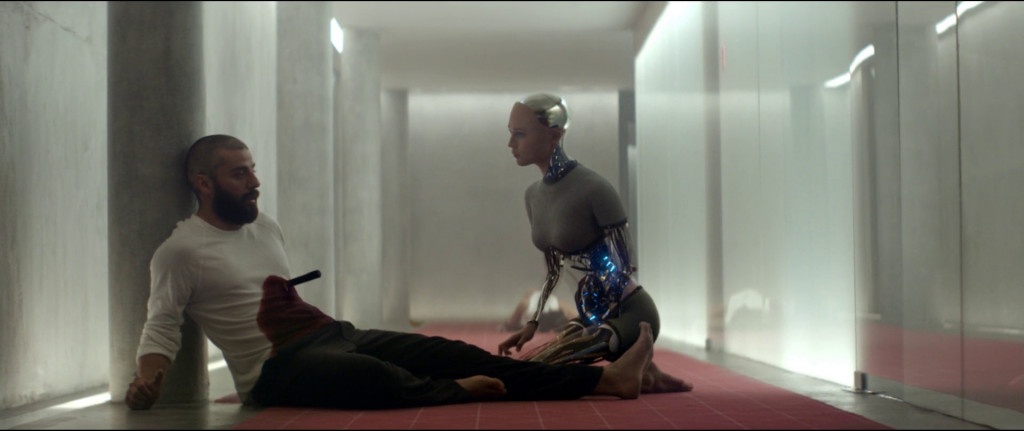
When Ava bends down in front of Nathan to take his key-card from his pocket, Nathan says, “Ava”. We hear this from a human perspective, and then the camera switches to Ava’s perspective where we hear a sound that we don’t understand. What we do understand is that this is how Ava perceives sound. This is her language and this is the language in which she speaks to Kyoko.
This additional information was supposed to make people realise that Ava’s interpretation of the world, the humans and consciousness is different from our interpretation. And that, at all times, Ava knows what you’re speaking or thinking, but you don’t know a single thing about her.
Read More: Arrival Ending Explained

